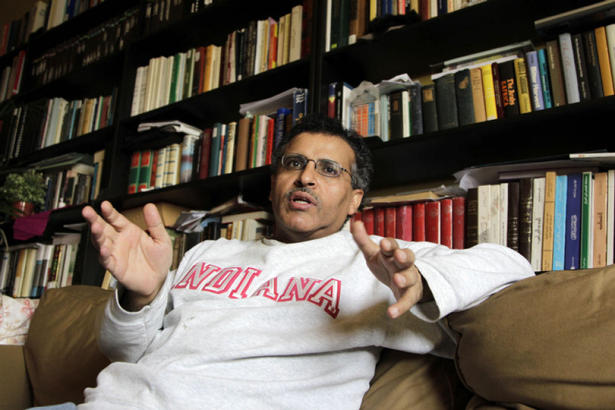Saudi Arabia Feature: The Professor on Trial for Speaking Out (Lippmann)
 Mohammad Al-Qahtani (Photo: Hassan Ammar/Toronto Star)Thomas Lippmann writes for Al-Monitor:
Mohammad Al-Qahtani (Photo: Hassan Ammar/Toronto Star)Thomas Lippmann writes for Al-Monitor:
What are the limits of free speech and open dissent in the Kingdom of Saudi Arabia? They are often unclear and seemingly arbitrary, but there is no doubt that Dr. Mohammad al-Qahtani, a professor and activist, went well beyond them, and he knew it. He was hardly surprised when Saudi prosecutors, finally fed up with his vociferous denunciations of the regime, hit him with a long list of criminal charges. He had predicted it, and in the context of Saudi Arabia, he was asking for it.
“Make no mistake,” he said shortly before a recent procedural hearing on his case. “We are all going to prison.” By “we” he meant himself and two colleagues in the Saudi Civil and Political Rights Association, perhaps the most outspoken and daring agitators for human rights and personal freedom in the kingdom.
Saudi Arabia is an autocratic monarchy in which citizens are disenfranchised, but it is not North Korea. People travel freely, have access to the Internet and are generally free to grumble about official incompetence or inadequate public services, as many do. But criticism of the monarchy, of the personal foibles of the king and senior princes, or of Islam and the religious establishment is prohibited. Signing a petition asking for the creation of an elected parliament has been tolerated, but it has been risky to go much beyond that.
Al-Qahtani clearly ventured into forbidden territory. He openly referred to the late Prince Nayef bin Abdul Aziz, the longtime Interior minister, as “a criminal” for the state’s alleged abuses of thousands of political prisoners, and demanded that King Abdullah not only fire him but prosecute him. Before Nayef’s recent death, al-Qahtani’s group circulated a petition asking that Nayef be removed as crown prince because he was “not fit to be the next king".
He and his colleagues also embarrassed the regime by publicizing the case of a reform-minded young prince who says he was drugged and kidnapped by Saudi agents in Geneva, hauled back to Saudi Arabia and placed under house arrest.
Al-Qahtani is one of very few activists who talk openly about the possibility that the al-Saud regime, which has ruled for nearly a century, could be replaced. He does not call for the overthrow of the regime, but in conversations and in interviews with non-Saudi media he suggests that it could bring about its own downfall by refusing to reform and modernize. In that he goes beyond even reform-minded liberals who share some of his views. They generally avoid any such discussion — partly because they think the monarchical system is capable of change and preferable to any known alternative and partly because, as some will admit, they are unwilling to sacrifice their own comfortable positions by speaking out against a system from which they benefit. To them, al-Qahtani is not just courageous but reckless, a characterization he rejects.
“Are we going to be quiet?” he said in a long conversation conducted openly in the lobby of a Riyadh hotel. “This regime is enslaving my people. If we keep our mouths shut, nothing will happen. Tens of thousands of people are locked up. We have to do something about this.” He said the ruling princes routinely enrich themselves through corrupt land deals, and “they control the courts and the media. Our strategy is to ‘name, shame and blame.’”
Following that strategy, he said, “we uncovered a secret prison in Qassim where a young Yemeni was tortured to death. We wrote a letter to the secret police. We told them ski masks won’t hide the identity of the torturers, we know who they are. We cited the names in a document we sent to the UN I think the secret police were horrified that we did that, that we made this public.”
He and his colleagues want “the rule of law,” he said, and if the law is corrupt because it is manipulated by the regime that dictates it, then the regime itself must be forced to change.

 Saturday, June 30, 2012 at 8:34
Saturday, June 30, 2012 at 8:34
Reader Comments